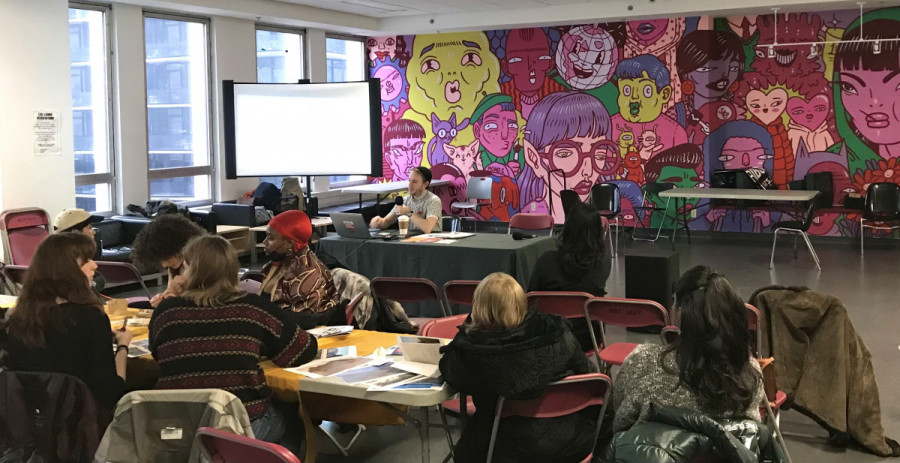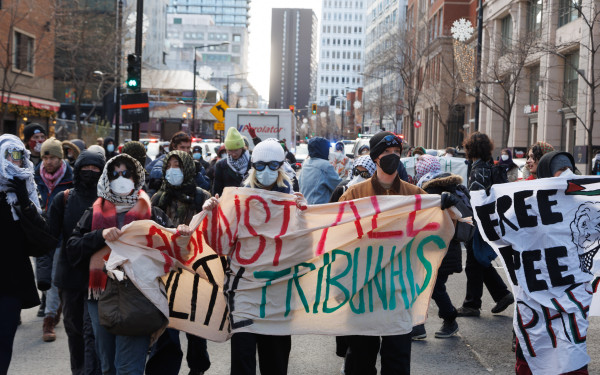Teach-in held amidst student strike
Students seek guidance in fight against tuition hikes
On Jan. 31 and Feb. 1, Concordia student associations opposed to the Coalition Avenir Québec’s decision to increase tuition for out-of-province and international students, held a teach-in called AGITATE on the seventh floor of Concordia’s Hall building.
The event, which aimed to educate and nourish students, occurred after 12 Concordia student associations voted to protest the tuition increase by holding a three-day strike.
“We just kinda wanted to create a space for people to come in between pickets and learn, hang-out, get fed,” said Ella Albers, a Concordia history student and one of the teach-in’s organizers.
Juliana Rodriguez, another organizer of the teach-in, said the strike is more than just about sending a message to the government. “We believe that education should not necessarily be inside a classroom,” said Rodriguez. “These spaces are actually to spark imagination in people [… ] where they can actually learn from each other.”
The teach-in featured free food and workshops on legal self-defence, Black radicalism, the student movement, Concordia student tribunals and other topics. It also featured a screening of “Red Square on a Blackboard,” a film about the 2012 Quebec student strike.
The red square is a symbol of the student movement and was worn by some of the teach-in’s attendees.
John Hutton, a former Concordia Student Union finance coordinator, held a workshop called “Education shouldn’t be a debt sentence.” During the event, he addressed attendees by saying, “Right-wing politicians are trying to privatize and sell university to the highest bidder.”
“But, as we established earlier in the presentation, it’s hard to increase tuition fees in Quebec because the students fight back,” he added.
To justify the tuition hikes, Premier François Legault has made several statements since October 2023, when the hikes were initially introduced. He stated: “When I look at the number of English-speaking students in Quebec, well, it threatens the survival of French.”
Hutton addressed Legault’s justification for the tuition increase, saying: “If [Legault] really cared about the French language, he would be supporting francisation programs.”
When asked if he agrees that French is in danger, Jackson Esworthy, one of the teach-in’s organizers, said that the government’s reasoning is “a bit of a smoke-screen that’s being put on by a populist right-wing government that doesn’t really give a fuck about anybody’s rights, be they educational, [or] healthcare.”
The World Atlas of Languages of the United Nations Educational, Scientific and Cultural Organization does not categorize French as an endangered language in Canada. It does, however, categorize Indigenous languages in Canada as being endangered.
Although the provincial government has decided to raise tuition in order to “protect French”, students are drawing inspiration from previous movements. Their goal is to keep education accessible.
“The fight for accessible education has been going on since the sixties,” said Esworthy. “And the students have been winning every single time.”
Notably, in March 2011, Jean Charest's Quebec Liberal Party announced a contentious plan to hike university tuition by 75 per cent over five years, triggering widespread student protests led by over 60,000 members of the CLASSE coalition. The ensuing seven-month tumult, marked by daily protests, campus strikes, and clashes with police, ending in the cancellation of the fee increase following the Parti Québécois's electoral victory in September 2012.
Although student associations are aware of the challenges they might face, they are not ready to give up. According to Rodriguez, future strikes will occur if necessary.







